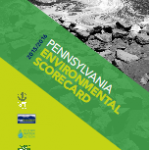2015/2016 Pennsylvania Environmental Scorecard
Our organizations believe that democracy works best when the electorate is informed about crucial votes that affect them and our environment—and can use the information to engage their elected leaders and hold them accountable.
Downloads
The Pennsylvania Environmental Scorecard is a joint project of Conservation Voters of PA, PennEnvironment, Sierra Club Pennsylvania Chapter, and Clean Water Action.

Click here to view the scorecard.
Our organizations believe that democracy works best when the electorate is informed about crucial votes that affect them and our environment—and can use the information to engage their elected leaders and hold them accountable.
Towards these goals, our organizations collaborate regularly on a Pennsylvania Environmental Scorecard which compiles a list of the most crucial environmental votes that have taken place in the Pennsylvania General Assembly during the current session. Our organizations reached out to other environmental advocates and non-profit leaders to make sure we’re reviewing and scoring the most important and highly-watched environmental votes. Prior to these votes, our organizations worked together to make sure our elected officials had the resources and information to know how to cast a vote for the environment. This includes direct advocacy with legislators and their staff; online advocacy from our organizations and our members; position papers explaining the legislation in question; and other modes of communication.
As this scorecard shows, our elected officials in Harrisburg too often cast their vote with polluters and their well-heeled lobbyists instead of protecting our health and environment. The continued influence of unlimited campaign contributions from the fossil fuel industry and other anti-environmental interests has led to an increase in the number of legislators—both Democrats and Republicans—who regularly cast anti-environmental votes. These votes put our air, water, and natural heritage at risk by undermining, preventing, and rolling back both existing and newly proposed environmental protections.
The 2015-2016 session included bills designed to derail efforts to update protections from fracking as well as traditional oil and gas drilling; bills creating additional hurdles for policies meant to address climate change; and even legislation promoting commercial development like hotels and golf courses in our state parks.
We will remember the 2015-2016 legislative session largely for its environmental attacks and legislative rollbacks. We encourage readers to look up how their Representatives and Senators voted, and to use this document to arm themselves with a better understanding of the environmental state of our Commonwealth.
